The British public can no longer afford its governments to run reckless around the world with no heed to the long-term consequences, write Phil Miller and Mark Curtis.
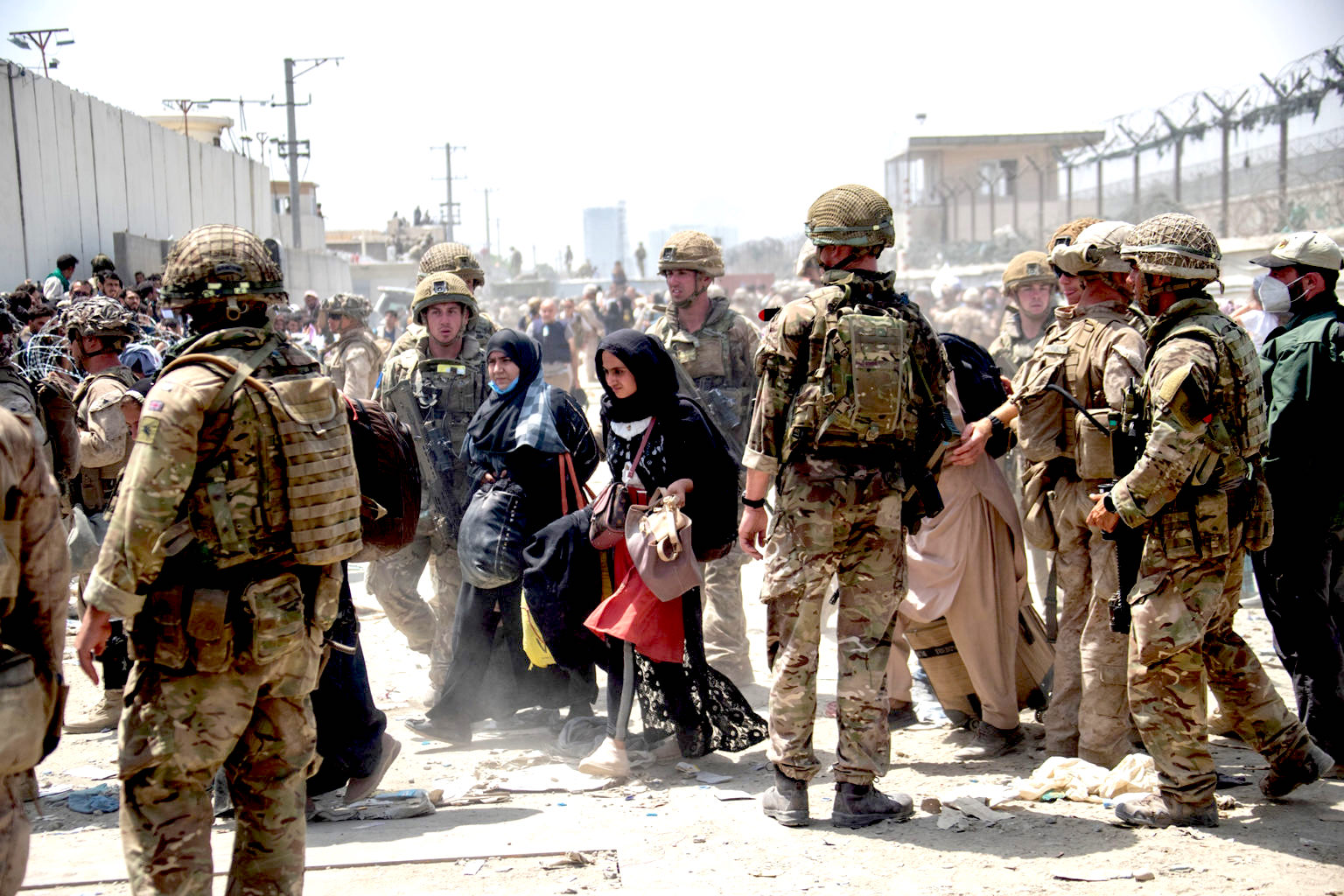
British troops evacuating Afghans at Kabul airport on Aug. 21. (MOD)
By Phil Miller and Mark Curtis
Declassified UK
“We have no eternal allies and we have no perpetual enemies,” Lord Palmerston famously told the British parliament when he was foreign secretary in 1848. Over a century and a half later, during the so-called war on terror, Britain has abided by Palmerston’s morally ambiguous approach towards international relations, with disastrous results.
The head of Britain’s military, General Sir Nick Carter, illustrated this perfectly when he said last week: “I think you have to be very careful using the word enemy. I think people need to understand who the Taliban actually are … and the plain fact is that they happen to live by a code of honour and a standard… [which] has honour at the heart of what they do.”
Carter said the Taliban are “country boys” who, despite killing 457 British troops, are: “bound together by a common purpose which is they don’t like corrupt governance, they don’t like governance that is self-serving, and they want an Afghanistan that is inclusive for all.”
Stopping short of inviting the Taliban to the arms fair in London next month alongside fellow human rights abusers like Egypt and the United Arab Emirates, Carter concluded: “We have to be patient, we have to give them the space to show how they are going to step up to the plate.”
For the British paratroopers desperately evacuating their former interpreters from Kabul airport, or the 300-plus U.K. military personnel maimed by the Taliban in 20 years of war, it must have sounded like the ultimate betrayal.
But the history of British foreign policy shows that U.K. governments’ friends and enemies are often interchangeable over time. Whitehall decision-makers lack a commitment to ethics and too often base decisions on short-term, pragmatic considerations of elite interests at the time.
When Hitler took power in Germany, British spies shared intelligence with a nascent Gestapo in the fight against a common enemy, communism. Once Hitler’s fascism threatened the U.K., “Uncle Joe” Stalin became Britain’s ally against the Nazis. But when Berlin fell, the Soviet Union would be Whitehall’s foe for 45 years of Cold War.
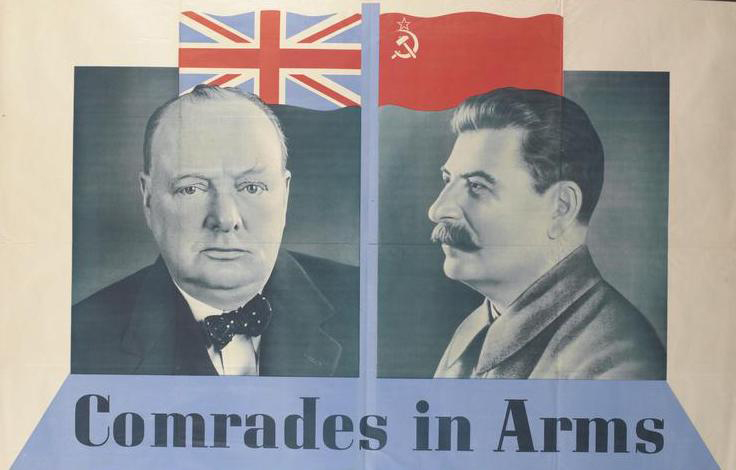
A British government propaganda poster from World War II. (Supplied to Declassified UK)
During that conflict, an early British enemy was Chin Peng, leader of the Malayan Communist Party who led a popular uprising against British rule in its then colony of Malaya. Peng had previously been a key British ally in World War II against Japan, so once he became an enemy, U.K. officials had to embarrassingly withdraw the OBE [Order of the British Empire] they had given him.
Some 519 U.K. personnel died fighting Peng’s group in the Malayan jungles, a war in which Britain tried to preserve control over the country’s lucrative rubber industry.
Right now, British air defense units in Saudi Arabia are scanning the skies for missiles fired by Yemen’s Houthi rebel movement, with whom the British and Saudis have been at war for over six years.
Little known is that the Houthis’ forefathers from the Zaydi religious group in Yemen were covertly armed by MI6 in the 1960s to fight against Egypt’s secular President Gamal Abdel Nasser — a years-long covert operation that caused tens of thousands of deaths.
The Houthis are now backed by Tehran, which makes them the U.K.’s enemy, although in the 1980s Britain helped Iran’s new clerical regime hunt down and execute communists, as well as allowing arms exports to reach the country during its deadly conflict with Iraq.
Britain’s bravest foot soldiers are mostly recruited as teenagers from poor towns where history lessons do not teach these twists and turns in Whitehall’s policy-making. Otherwise, there might be a shortage of cannon fodder to fight whoever ministers and the media declare as the enemy of the day.
Communists, fascists and religious extremists can all be British allies or adversaries depending on the circumstances and who might further U.K. elite interests at the time.
General Carter hinted at making up with the Taliban several years ago. In 2013, as deputy commander of the NATO mission, he expressed regret that Britain and the U.S. did not seek peace with the Taliban months after the invasion began, saying a negotiated exit from Afghanistan was possible as early as 2002.
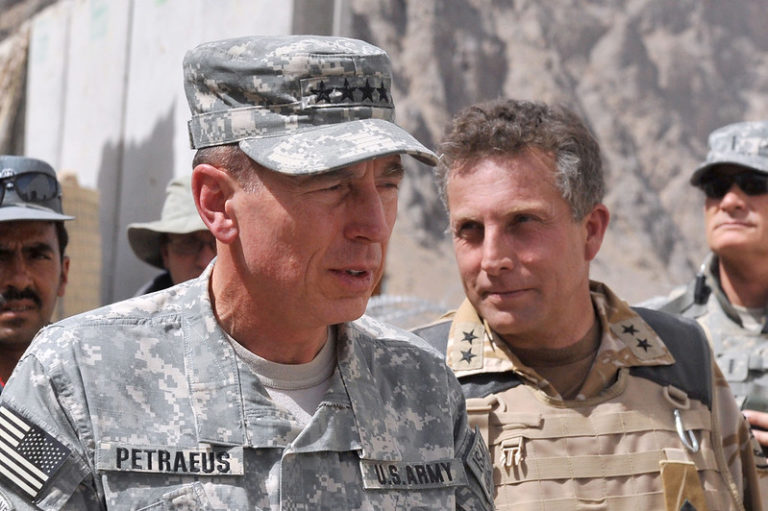
General Carter, at right, with U.S. General Petraeus in Kandahar, Afghanistan, 2010. (ISAF, Bradley Lail)
Although Carter commented it was “easy to be wise with the benefit of hindsight,” the anti-war movement had said as much at the time. They argued some elements of the Taliban were prepared to hand over Osama bin Laden for trial after 9/11 and it was unnecessary to attack an entire country for harboring a terrorist group led by mujahideen the CIA had themselves armed in the Cold War.
After all, the hijackers were drawn almost exclusively from Saudi Arabia — a regime as brutal as the Taliban but beloved by the West for its oil and Britain’s major ally in the Middle East.
Britain has only deepened relations with Saudi Arabia since 9/11, with Foreign Secretary Dominic Raab recently meeting its leader Mohammed bin Salman, even as the latter is accused of orchestrating the dismemberment of journalist Jamal Khashoggi.
Invading Iraq
Instead of treating 9/11 simply as a crime, or conducting limited airstrikes against Al Qaeda camps in Afghanistan, U.S. President George W. Bush and U.K. Prime Minister Tony Blair embarked on what they claimed was an attempt to spread democracy — while simultaneously supporting a slew of dictators across the Gulf and North Africa.
Eighteen months after the invasion of Afghanistan came Iraq and the toppling of Saddam Hussein, whom Britain had armed, along with his adversary Iran, in the Iran-Iraq war of the 1980s.
The 2003 invasion was publicly justified in order to destroy weapons of mass destruction and, according to then U.S. Secretary of State Colin Powell, deny Al Qaeda a safe haven in Iraq. Only there were no illegal weapons, except for perhaps the anthrax Britain had earlier sold Saddam.
Nor was there an Al Qaeda cell in Iraq, until Anglo-American regime change created a power vacuum in which terrorists flourished and eventually morphed into something worse than even Osama bin Laden — ISIS.
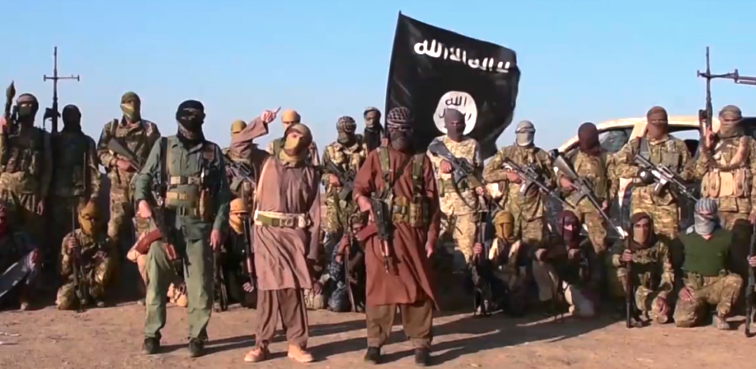
(Screenshot from an ISIS propaganda video)
Again, the anti-war movement correctly predicted the invasion would be a disaster, and that in truth this was a war for oil and control of the Middle East. But British intelligence went along with it and failed to warn publicly what it knew privately — that it would increase the terror threat to the British public.
Within two years of the invasion, London buses and tube trains were blown to bits in the 7/7 terrorist attack while British troops in Basra, southern Iraq, were besieged by the “Mahdi army” led by Iraqi cleric Muqtada al-Sadr.
He became enemy No. 1 for coalition troops, but by 2018 his political grouping won the largest number of seats in Iraq’s parliament. They then voted for all foreign troops to leave the country.
The invasion brought a version of democracy to Iraq, and that democracy resoundingly rejected the occupation.
Assault on Libya
The folly of Iraq and Afghanistan in the 2000s was not enough to prevent Western leaders from trying similar interventions the following decade in Libya and Syria. Although some British politicians now complain the U.K. military has been too dependent on American power in Afghanistan, in Libya it was France — not the U.S. — which led London to war with Gaddafi.
Paris was secretly motivated by “a desire to gain a greater share of Libya oil production and increase French influence in North Africa.” Such a base motive could not of course be used to justify war to citizens. Instead, the world was told an impending massacre in Benghazi, Libya’s second largest city, had to be averted.
A British parliamentary inquiry subsequently found that such fears of a bloodbath were “not supported by the available evidence” and a negotiated settlement was probably possible.
But NATO opted for a full-scale assault on Libya, with French President Nicolas Sarkozy hoping the war would “improve his internal political situation in France” and “provide the French military with an opportunity to reassert its position in the world.”
His advisers also feared Gaddafi’s “long-term plans to supplant France as the dominant power in Francophone Africa.”
British oil interests in Libya were actually quite well served by Gaddafi, who had allowed BP back into the country once Tony Blair’s government helped round up members of a rebel Islamist group which had tried to kill the Libyan leader (with the backing of MI6) in 1996.
Those rebels, from the Libyan Islamic Fighting Group, resumed being allies in 2011 when NATO aided their advance on Tripoli. When Libya descended into anarchy after Gaddafi’s fall later that year, the Royal Navy rescued a number of Britons from the country. They included the rebel group’s children like Salman and Hashem Abedi, who three years later blew up 22 people at a pop concert in Manchester.

Hashem Abedi holding a machine gun. (Facebook, Ramadan Abedi)
Salman Abedi had been trained in a terrorist camp complex in Libya that had burgeoned in the “ungoverned spaces” produced by the Anglo-French war. Yet former Prime Minister David Cameron and other British ministers will not be held to account for their war, just as Tony Blair never will be over Iraq.
A decade after the intervention, Libya remains mired by civil war which spilled over into other countries in the region, including Mali, where hundreds of British troops are now serving on yet another front in the war on terror.
Indeed, the 10 years since the West’s war in Libya has witnessed unprecedented levels of terrorism across west, east and southern Africa. Who will investigate British responsibility for this?
And to top it all off, Gaddafi’s son Saif has evaded capture and is planning a political comeback, much like the Taliban. Meanwhile, Sarkozy has been convicted of trying to bribe a judge who was investigating allegations that Gaddafi funded his 2007 French presidential campaign.
Stoking the Syrian war
Despite all these failed interventions, some still point to the situation in Syria and say Britain should have invaded there too. President Bashar al-Assad, with his British wife Asma, is undoubtedly a ruthless dictator.
Yet before the uprising against his rule began, Britain was conniving with his odious regime. PR firm Bell Pottinger helped launder his family’s reputation and a U.K. company was allowed to sell Syria chemicals capable of making the Sarin nerve agent.
Although Parliament voted against military action to topple Assad in 2013, Whitehall has since then spent around £350-million to secretly support Syria’s opposition, sometimes helping to empower its most extreme elements.
An Al Qaeda affiliate, Hayat Tahrir al-Sham (HTS), now controls Idlib province near the Mediterranean shores, where women’s rights are hardly better than under the Taliban.
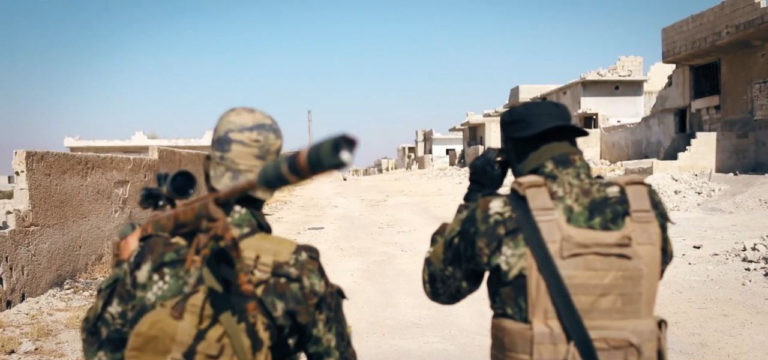
HTS fighters patrol Idlib. The group welcomed the Taliban’s takeover of Kabul. (HTS propaganda)
The U.K.’s covert program in Syria, conducted with the U.S. and its Arab allies, helped prolong the war and contributed to millions of refugees streaming out of the country — a fact the U.K. media seems to have barely noticed.
The highly controversial British support to the Syrian rebels has only once caused a political scandal, when Priti Patel had to resign as international development minister for trying to divert British medical aid to Al Qaeda-linked fighters in Syria.
But Patel has rebounded from the scandal and, as home secretary, is now in charge of protecting Britain from terrorism.
One of the U.K.’s key allies in backing Syrian (and Libyan) militants is Qatar, a gas-rich Wahhabi autocracy with no free press and whose penal system hands out 100 lashes for adultery.
As British troops were dying in Afghanistan during 2013, Qatar began hosting the Taliban’s “political office” and negotiating team in its capital, Doha, and helped bring them in from the cold.
Despite effectively supporting the Taliban in that time, Qatar was allowed by Whitehall to form two joint flying squadrons with Britain’s Royal Air Force, in return for spending its gas wealth on British arms.
When asked what assessment Britain’s defense chiefs had made of Qatar’s alleged support for terrorism, a contentious matter currently before the U.K. courts, Parliament was told in June: “All relevant considerations were taken into account when deciding to establish joint squadrons with Qatar.”
Defence Minister James Heappey said: “The long-standing friendship between the U.K. and Qatar is more important than ever. With shared defense and security interests, it is vital we work together for both regional and global stability.”
Convincing the Public
Following these four wars, one wonders how much longer British ministers and the media will be able to keep convincing the troops and sections of the public about who its friends and enemies really are.
One thing elites have already learned is that their interventions are generally unpopular, hence they have substantially shifted to covert operations, in at least eight countries, where they can avoid any democratic scrutiny.
If the anti-war movement had been listened to 20 years ago, perhaps Britain could have ended its alliance with Saudi Arabia rather than stepped it up. Perhaps British officials, instead of wasting lives, money and time on illegal and immoral wars, could have redirected efforts in government to fighting our real common enemy — climate change — and prioritized diversification away from fossil fuels in good time.
But there is less global “prestige” in that for Whitehall, steeped in centuries of being an imperial power. Instead, it was easier to squander decades of blood and treasure on a so-called war on terror, even if this did little to reduce terrorism and actually spread it to more countries than ever.
Among the few beneficiaries appear to have been shareholders in arms companies, whose profits often determine government policy, especially since officials can find lucrative employment in private weapons firms after they leave office — with no questions asked.
While successive governments have been privileging military spending and building a new generation of power projection forces — especially two massive aircraft carriers — they have neglected key potential investments in green technology, flood defenses and public health.
The Ministry of Defence should either truly become that or else be renamed to describe what it is — a department for war.
Governments’ prioritization has left the British public vulnerable to a far more persistent threat than the 7/7 suicide bombers could have envisaged: train stations flooding with water and cars floating down streets, a glimpse of which terrified London residents saw last month during flash floods.
Now that Westminster is no longer pretending to rebuild Afghanistan, perhaps we can build Britain to withstand the real environmental threat facing all its citizens this century. And perhaps we just might have that hugely needed public debate on how we move the U.K. away from being a warmonger to having a true defense policy that protects the public.
The British public can no longer afford its governments to run reckless around the world with no heed to the long-term consequences. We can no longer afford not to have an ethical foreign policy.
Phil Miller is chief reporter, and Mark Curtis is editor, of Declassified UK, an investigative journalism organization that covers the U.K,’s role in the world.
The views expressed are solely those of the authors and may or may not reflect those of Consortium News.

I never knew Chin Peng had been given an OBE.
However, the Malayan war was won after 12 years. I very much doubt that the present population of Malays would have preferred the result to have gone the other way. Malaya is, far from a democracy but is better off than it would have been as a communist state.
The credit to Julian Assange is long overdue by even
the best of investigative journalists
The old colonial powers continue their evil ways. You reveal a back story that is typically not well known and at the same time reveal a bigotry that is typical of “The West”. Al Assad is a brutal dictator is he? Here’s the definition of dictator
a ruler with total power over a country, typically one who has obtained control by force.
Assad did not get control by force and he has been elected several times. The extent of control is generally dictated by a country’s constitution. I don’t know what Syria’s constitution says but I do know that your country, Britain, doesn’t have one. My country, the US, has one but, like our money, it is currently being printed on toilet paper.
The implication behind dictatorship is that it rules irrespective of the wishes of the citizenry. Remarkably, you admit that that is exactly what the British rulers are doing but don’t seem to have enough self awareness to recognize that is effectively a dictatorship. No different than what you accuse Syria of being. The same is true of the US. Here, we only have two political parties, largely because of the structure of the electoral system makes more than two difficult, and for some time now they have presented the electorate with Hobbs choice for rulers. Is this not also a dictatorship?
Poodle is
as
poodle does.
Were it not for U$ “adventures” and imperial “philosophy”, what would the “subjects” of royalty actually demand of their government?
Get back to us when your National Health Service looks a pale copy of the U$ privatized, failing, woefully (and deliberately) ineffective for-profit health insurance system.
Yeah, Tony Blair was a real piece of “God’s work”.
However, nov you’ve Keir Starmer, and Corbyn forever branded an “anti-Semite”.
So, precisely what do you imagine that it “take” for the many, in the U.K. to reach the place where they have had “enough” of empire and slaughter?
I ask simply as that just might inspire those of us separated by a common language to reach the same conclusion here, in the indispensable and exceptional nation, patterned as it is, in far too many disrespects, on yours – especially that whole notion of Anglo-Saxon superiority, and being favorites of the Almighty.
Frankly, I suspect that the personal “identity” of far too many folk, in both the U.K. and the U$, is premised upon knee-jerky “patriotism” and a smug sense of their very own specialness to be part of the empires of destruction.
As well, in both societies, narrative control is quite clearly tied to the interests of Big Finance, Big Banks, and those who profit from war, especially among the ruling political and legal system elites, and the media which “service” such “interests”.
“Men with Guns” as heroic, as the source of all wealth, plenty, and power, is deeply etched into both cultures, yours even embraces the long bow and knights in shining armor.
Both societies might well benefit from some realization that butchery and nuclear weapons ought not be celebrated but held in grave contempt as nothing but barbarism.
Recall that it was once suggested, to your culture, specifically, that “Western” civilization, were to actually exist, might be a good thing.
Certainly, both our societies have sufficiently bloody enough histories to rationally have had, in the human level, more than enough of such behavior, even if it has become profoundly profitable over the last several hundred years for those playing the Great Game, much to the dire cost of everyone else.
Should the Great Gaming continue very much longer, it will likely put an end to human existence, even before environmental collapse brings on the same result.
Thank you for an amazing compilation of the foreign policy history of British elitists and their servants in government. As unprincipled as it can all seem, I think there is one thing that does tie it all together: The efforts of the British elitists to do their part in keeping the disease of the world-wide profit system going even as the people of Britain are becoming more and more resistant to it. People all over the world are finally becoming persistently more and more against economics based on greed i.e. get all you can, while giving as little as you can. The writing is on the wall and elitists everywhere, and the elitism in ourselves, is frightened and fighting back and the suffering will only increase until this rotting form of economics is given up as an evil choice as we look for a better means of making money, and having jobs.
The public has been served a pablum of lies by the British and American governments.
Where are the Nordic Countries, the so called demo-socialist countries to condemn this????
Why is the world remaining complacent??
It’s also important to note that Gaddafi had proposed a pan-African, gold-backed currency that would have threatened the hegemonic fiscal power of the global north.